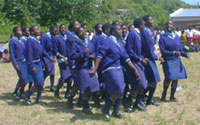Civil society budget monitoring for national accountability
Download report  - 550Kb ~ 3 min (54 pages) - 550Kb ~ 3 min (54 pages)
Workshop Report, 17 – 19 February 2004, Lilongwe, Malawi
Prepared by Kate Dyer and Chris Pain for OXFAM GB
Posted with permission of Oxfam GB.
Contact: brandondyer@eoltz.com

|
|
Participants, Photograph by Arman Navasardyan, OXFAM (GB) Armenia
|
The fourfold objectives of the workshop were identified in advance as being:
-
To bring together individuals and representatives of organisations involved in budget monitoring, or the development of monitoring processes and tools, with a view to developing a supportive community of practice of those organisations/ individuals.
-
Locate budget tracking exercises within the broader budget cycle and budget work in general.
-
Analyse work done to date, through the development of a case studies, assessing their impact and the nature of the tools and methods that were used
-
Identify best practices in terms of budget tracking work, including ensuring its gender sensitivity, and linkages into lobbying and advocacy activities.
|
Civil society coalition for quality basic education
Download  - 446Kb ~ 2 min (36 pages) - 446Kb ~ 2 min (36 pages)
Budget monitoring exercise 2003
Posted with acknowledgement to the Civil Society Coalition for Basic Education
Contact: cscqbe@sdnp.org.mw

|
|
Schoolgirls dancing in rural Malawi, Photograph by Rhino Chiphiko, Lilongwe
|
Abstract
Malawi’s approval of a Poverty Reduction Strategy in April 2002 also saw the government
adopt a somewhat new approach towards the budget involving the identification of Priority
Poverty Expenditures, to be protected in times of financial stress. Various civil society
organisations and coalitions have welcomed this move and are keen to observe the
implementation of this approach and monitor the results and impacts these have on the
country. Within primary education the PPEs are identified as teaching and learning materials,
teacher’s salaries, teacher training and teacher housing. In total, MK 1,049 million was
allocated to these PPEs in financial year 2002-3. However, changes in what has been included
as PPEs from year to year make temporal comparisons difficult, the two PPEs for which
information is available for all three financial years, teaching and learning materials and
teacher training, have both registered declines in real terms in 2002-3 compared to 2001-2.
|






